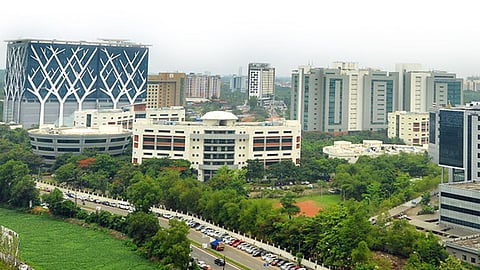

As Kerala embarks on upscaling its IT industry, space constraints, and global economic turmoil,
have become nagging concerns that could delay the State from hitting the target.
The draft IT policy prepared by the Kerala government last year set ambitious targets--like garnering a 10 percent share of the national IT industry exports; tripling the availability of space for IT and allied industries through private participation and decentralised growth; and, creating 5 lakh new jobs in the sector. Given the current circumstances, how much of it can be achieved is anybody's guess.
Kerala has attracted top IT companies to set up base and the double-digit growth in IT software exports has been robust. However, the base is still small compared with the national average of exports. In 2023-24, the total IT software exports from Kerala, mainly from the three IT parks--Technopark in Thiruvananthapuram, Infopark in Kochi, and Cyberpark in Kozhikode--came to about Rs 25,000 crore. But, this is only a little over 2 percent of India's total software exports of $126 billion in 2022-2023.
Of the three parks, Infopark is the fastest-growing, with a year-on-year growth of over 24 percent on an export revenue of Rs 11,417 crore in 2023-24. The park employs around 72,000 people in 580 companies including its satellite parks at Cherthala and Koratty.
However, Infopark is struggling to add more space for expansion of phases 3 and 4, according to its CEO, Susanth Kurunthil. A township project was submitted to the Greater Cochin Development Authority to be implemented through the land-pooling method about 6 months ago.``Though it was included in the government's 100-day action plan, we are yet to get the sanction."
Mr Kurunthi said the project, which would require 300 acres, could be located wherever surplus land was available; for example, Nedumbassery, Pallikara, Varapuzha, and Muttam. Under land-pooling, there was no need to acquire the land. The land would be developed by Infopark and a portion would be handed back to the landowners, who could then sell it for a premium. However, 80 percent of the landowners would have to agree to it.
Space may not be an immediate issue for Technopark, the largest IT campus in Kerala, which was also the first IT park in India. It now houses 490 companies which employ 75,000 people and is the top export earner. In 2023-24, the value of its exports was Rs 13,255 crore, a growth of 14 percent over the previous year.
Technopark is in the process of implementing projects in phases 3 and 4 which have already been taken by projects such as the Embassy Taurus Techzone, the Rs 1600-crore Technocity, and the Rs 800-crore TCS complex. Finding land for further expansion could be a problem. The 15-lakh-feet Embassy Taurus Techzone--a project by the global private-equity real-estate firm Taurus Investment Holdings and the Embassy group--in phase III of Technopark, has been able to attract several top companies.
The Technocity Quad project, which includes an IT office building of 8.5 lakh sq ft of Technopark, is expected to be completed in the next few years. The park is trying to bring companies from various domains to its campus. Cyberpark, the smallest of the three, with the advantage of accessibility from Kozhikode, Kannur, and Mysore airports and proximity to higher educational institutions like NIT and IIM, is also on the lookout for more land for expansion.
Startups are another area of focus for Kerala with the draft IT policy targeting 20,000 startups by 2030. At present, the State has 6,100 startups registered under the Department for Promotion of Industry and Internal Trade (DPIIT). Kerala Startup Mission (KSUM) CEO Anoop Ambika believes the target is achievable. At present the State is adding 100-150 startups a month ``By putting in some more effort we can make it 200,’’ he said.
KSUM is planning to focus on five key areas--food and agriculture; space sector; digital media and entertainment; healthcare and life sciences; and, renewable energy--in its future projects ``We are going for a sector-specific approach in these areas where we can make use of tools such as AI, industrial cloud and blockchain. We are planning to roll out the concept by December,’’ Anoop Ambika said.
G. Vijaya Raghavan, founding CEO of Technopark, feels the IT sector in Kerala is growing at a decent rate but the government’s effort to attract private investment may not find success in the short term because overall job creation globally is not satisfactory. He reckons that
getting a 10 percent share of the national software exports is going to be a tall order.